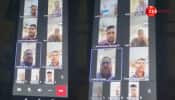New Delhi: Narcoanalysis, used for the
first time by a Dallas obstetrician in 1922, and brain mapping
had always been a matter of controversy which divided
investigators on one side and the civil society on the other.
The scientific tools used to collect information from
suspects who are unable or unwilling to provide it otherwise
have been marred with doubts about their reliability and
validity.
Narcoanalysis or truth serum test involves
administration of intravenous hypnotic medications called
truth drugs.
The serum`s chemical name is sodium pentathol and it
is mixed in distilled water before being given to the person.
The dose is dependent on the person`s sex, age, health and
physical condition.
The objective of the test, which could take anywhere
between one and three hours, is to extract information from
the accused when he is in a hypnotic state.
In such condition, a person is not in a position to
speak up on his own but can answer specific but simple
questions after giving some suggestions. The answers are
believed to be spontaneous as a semi-conscious person is
unable to manipulate the answers.
Although the test gives clues to the investigation,
rights activists say it is dangerous for the subject as
careless use of these truth serums can result even in death.
It`s not advisable to use truth serums in those who
have heart diseases and high blood pressure. High precautions
are to be observed while using truth serums in such persons.
The controversial test first reached the mainstream in
1922, when Robert House, a Texas obstetrician used the drug
`scopolamine` on two prisoners.
According to reports, American armed forces and
Intelligence agencies continued to experiment with truth drugs
-- mostly barbiturates -- during and after the War years.
A declassified interrogation manual reveals that the
CIA had been using these as part of its interrogation tactics.
In 1989, the New Jersey Supreme Court banned the use
of sodium amytal narco-analysis because the results of the
interview were not considered scientifically reliable,
although there was some use to the interviews.
The court opined that subjects are susceptible to
filling in gaps in stories with fabricated detail
(hyperamnesia), or believing in false events, and hypnotic
recall, where thoughts of non-existent events become embedded
in the memory.
Brain-mapping test is another scientific evidence
gathering practice which was developed and patented by
neurologist Dr Lawrence A Farwell, director and chief
scientist `Brain Wave Science`, IOWA in 1995.
In this method, also called the "Brain-wave finger
printing", the accused is first interviewed and interrogated
to find out whether he is concealing any information.
Then sensors are attached to the subject`s head and
the person is seated before a computer monitor. The sensors
monitor electrical activity in the brain and register P300
waves, which are generated only if the subject has connection
with the stimulus i.e. picture or sound.
During the tests, forensic experts try find out if a
suspect`s brain recognises things from the crime scene that an
innocent suspect would have no knowledge of.
In a nutshell, experts say the test matches
information stored in the brain with information from the
crime scene.
In USA, the FBI has been making use of "Brain mapping
technique" to convict criminals.
However, findings of brain mapping test run on
suspects were never admissible as evidence in a court of law.
A polygraph or lie detection test involves an
instrument that measures and records several physiological
indices such as blood pressure, pulse, respiration and
breathing rhythms and skin conductivity while a suspect is
asked a series of questions.
-PTI















